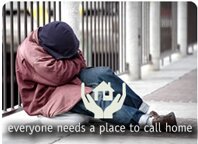The BBOT has developed a policy resolution on homelessness outlining the business case for ending the problem. It has been submitted to the Canadian Chamber of Commerce which will include it in its 2010 policy book if it receives the approval of two-thirds of its members. Once accepted, the national body will lobby Ottawa to develop a comprehensive plan to deal with the issue.
“Canada is the only G8 country without a national homelessness plan,” said Darlene Gering, BBOT president and CEO, in a press release. “Last year, the federal government spent $3.57 billion in direct spending on homelessness and affordable housing initiatives, but without a national plan to manage and coordinate the effort, Canada’s capacity to end homelessness is significantly diminished.”
In its policy resolution, the BBOT notes homelessness has a direct financial impact on businesses by deterring customers, making it difficult to recruit and retain employees, hurting tourism and discouraging companies from opening offices in areas with a visible homeless population.
Vancouver hotels have lost convention contracts worth $500,000 due to increased homelessness and the Hotel Vancouver spent $60,000 to upgrade its security to guard against aggressive panhandling. In Burnaby, the BBOT says, homelessness has increased by 105 per cent since 2005.
Providing housing for homeless people should be a first priority and is more cost-effective than dealing with the problems resulting or exacerbated by homelessness, it said.
Citing a 2007 study, the resolution notes that on average, each homeless person in B.C. costs taxpayers more than $55,000 per year, compared to the $37,000 it would cost to provide adequate housing and supportive services to them. That would save about $211 million per year in B.C. alone.
The costs of providing care in emergency wards, psychiatric hospitals and prisons to homeless people, “involves significantly higher costs than various forms of transitional, supportive and permanent affordable housing.”
Among its recommendations the BBOT is calling on the federal government to reallocate funds within the federal budget to develop a national plan to end homelessness, with creating and sustaining affordable and supportive housing as its first priority.
“Federal leadership involves providing a clear vision about what government aims to accomplish with respect to Canada’s homelessness issue,” the resolution says. “Without a clear direction that outlines what the federal government wants to achieve for the homeless, we can only expect limited progress.
Natalie Anne Lanoville
Manager of Donor Services
FIRST UNITED CHURCH MISSION



